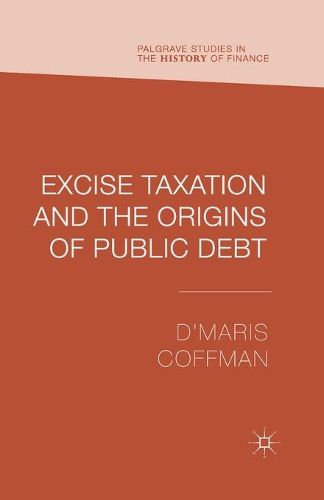Readings Newsletter
Become a Readings Member to make your shopping experience even easier.
Sign in or sign up for free!
You’re not far away from qualifying for FREE standard shipping within Australia
You’ve qualified for FREE standard shipping within Australia
The cart is loading…






This title is printed to order. This book may have been self-published. If so, we cannot guarantee the quality of the content. In the main most books will have gone through the editing process however some may not. We therefore suggest that you be aware of this before ordering this book. If in doubt check either the author or publisher’s details as we are unable to accept any returns unless they are faulty. Please contact us if you have any questions.
This book offers a wholesale reinterpretation of both the introduction of excise taxation in Great Britain in the 1640s and the genesis of the Financial Revolution of the 1690s. By analysing hitherto unpublished manuscript and print sources, D'Maris Coffman resolves divergent accounts of these constitutionally problematic but fiscally significant new taxes. Parliament’s success at imposing on a deeply divided kingdom an extra-legal species of indirect taxation, which hitherto had been a constitutional anathema and a political impossibility, remains one of the most striking features of the period. A fresh reading of William Petty’s Treatise on Taxes illustrates the development of an indigenous discourse in defence of the tax state. By highlighting the importance of fiscal innovation during the Civil Wars and Interregnum for the development of the fiscal state in Britain, this study challenges ‘stylised facts’ about the economic significance of 1688/89. The final chapter delivers new insight into why the eighteenth-century British public accepted both unprecedented levels of government borrowing and one of the heaviest tax burdens in Western Europe. Coffman reveals how a ‘new financial history,’ rooted in closely contextualised studies, can contribute to current debates about sustainable levels of taxation and to fundamental questions of economic theory.
$9.00 standard shipping within Australia
FREE standard shipping within Australia for orders over $100.00
Express & International shipping calculated at checkout
This title is printed to order. This book may have been self-published. If so, we cannot guarantee the quality of the content. In the main most books will have gone through the editing process however some may not. We therefore suggest that you be aware of this before ordering this book. If in doubt check either the author or publisher’s details as we are unable to accept any returns unless they are faulty. Please contact us if you have any questions.
This book offers a wholesale reinterpretation of both the introduction of excise taxation in Great Britain in the 1640s and the genesis of the Financial Revolution of the 1690s. By analysing hitherto unpublished manuscript and print sources, D'Maris Coffman resolves divergent accounts of these constitutionally problematic but fiscally significant new taxes. Parliament’s success at imposing on a deeply divided kingdom an extra-legal species of indirect taxation, which hitherto had been a constitutional anathema and a political impossibility, remains one of the most striking features of the period. A fresh reading of William Petty’s Treatise on Taxes illustrates the development of an indigenous discourse in defence of the tax state. By highlighting the importance of fiscal innovation during the Civil Wars and Interregnum for the development of the fiscal state in Britain, this study challenges ‘stylised facts’ about the economic significance of 1688/89. The final chapter delivers new insight into why the eighteenth-century British public accepted both unprecedented levels of government borrowing and one of the heaviest tax burdens in Western Europe. Coffman reveals how a ‘new financial history,’ rooted in closely contextualised studies, can contribute to current debates about sustainable levels of taxation and to fundamental questions of economic theory.